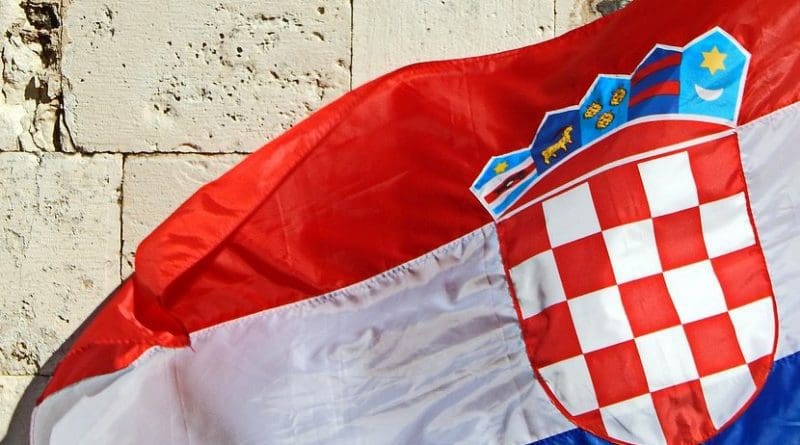Past Still Present In Three-Horse Race For Croatian Presidency – Analysis
Croatia’s past wars are still an issue in the campaign to become president in next month’s election. The centre-right incumbent is narrowly ahead, but faces challengers from Right and Left.
By Anja Vladisavljevic
Croatia’s presidential election next month is shaping up to be a three-horse race that will almost certainly go to a run-off between the Left and Right in January.
Backed by the ruling centre-right Croatian Democratic Union, HDZ, incumbent Kolinda Grabar-Kitarovic is narrowly ahead in opinion polls, followed by opposition Social Democrat candidate and former Prime Minister Zoran Milanovic.
Coming in third, and potentially pinching votes from Grabar-Kitarovic, is folk singer Miroslav Skoro, who is running as an independent but has been endorsed by a number of centre-right and right-wing parties and personalities.
On November 22, each pretender to the presidency began the job of collecting the necessary 10,000 signatures to take part, with the election due on December 22. The campaign, however, is already in full swing.
Analysts say none of the contenders have broached the hot button issues of the day for Croatia, from the economy to emigration, abortion to gay rights. What continues to trigger debate, they say, is the past – from Croatia’s fascist rulers during World War Two to the country’s part in socialist Yugoslavia and the 1991-95 ‘Homeland’ war it fought to cement its independence.
“I see that all candidates behave reactively, reacting mostly to each other. It’s not happening that someone imposes his or her agenda,” said communications expert Ankica Mamic.
Journalist and writer Ivica Djikic told BIRN: “It is certain that war – World War Two and the ‘Homeland war’ – is present, just as it was in all previous elections and probably for many future elections.”
‘The wars are over’
According to Mamic, the race really began back in May, when the monthly HRrejting survey placed Skoro on a list of potential presidential candidates. Sure enough, Skoro quickly confirmed his interest and in June announced his candidacy with a vow to strengthen the powers of the presidency beyond its current largely ceremonial role.
“I’m not saying I agree with what he’s asking for, but it is a legitimate topic,” Mamic told BIRN. “He is seeking to increase the president’s powers because he thinks that the president with these constitutional powers cannot bring change to a society that is seeking change.”
It is not Skoro’s first foray into politics. In 2008 he was a member of parliament for the HDZ but is now endorsed by, among others, the centre-right MOST party and the recently-created right-wing Croatian Sovereigntist coalition.
On November 16, at a small rally in the capital, Zagreb, Skoro described the salute ‘Za dom Spremni’ [Ready for the Homeland], used by the Croatian WWII fascist Ustasa movement and still popular among Croatian nationalists, as the salute under which the best man at his wedding “fought for Croatia in 1991.”
He also vowed to seek an international investigation into the WWII concentration camp Jasenovac and if necessary “dig everything up”. At least 83,000 people, mainly Serbs, Jews and Roma, perished in the Ustasa-run camp, a figure disputed by many on the political right in Croatia who tend to play down the crimes of the Ustasa.
Skoro later said his remarks had been taken out of context. Djikic said Skoro was counting on his voters “only reading the first statement, not the denial.”
Skoro also clashed with Milanovic, whose campaign erected a poster of the former prime minister in the eastern town of Vukovar – ravaged by the 1991-95 conflict – with the slogan, ‘It’s normal that the wars are over”. Skoro said it was not normal to tell the people of Vukovar that the wars are over and “to ignore their pain.”
Milanovic’s “message, which seems a common-sense message to me… immediately met, in my opinion, a completely incomprehensible reaction like ‘wars are not over’,” Djikic said.
Skoro’s strong showing appears to have nudged Grabar-Kitarovic further to the right.
Her rhetoric, said Djikic, “is intended for the electorate that is more right-wing than the HDZ, and that rhetoric will not be resented by the HDZ electorate that is voting for her no matter what views she promotes.”
January 5 run-off almost certain
According to the latest opinion poll, conducted by the PromocijaPlus agency, Grabar-Kitarovic is running at 26.4 cent, one percentage point down on October; Milanovic is on 26.4 per cent, half a percentage point up on last month, while Skoro is also slightly down on October at 17 per cent.
Trailing the pack is Mislav Kolakusic, a former judge and, since May, a member of the European Parliament. He is polling at 12.1 per cent, up roughly five percentage points on October.
Kolakusic has made a name for himself as the man behind a years-long campaign against asset seizures and bankruptcy legislation, winning admirer among indebted Croatians across the political spectrum.
He has also foresworn major campaign spending, saying voters can find out everything about his manifesto online.
Noting Kolakusic’s fluctuating poll numbers, Mamic said his voters are “volatile” and prone to “change their minds overnight in any direction.”
The run-off will be on January 5 if, as seem likely, there is one.
Then, said Mamic, the frontrunners will have to “sharpen their rhetoric” to reach beyond their traditional constituencies.
“It is almost certain that Zoran Milanovic is in the second round, so in the second round, we will have one candidate from the right-wing pool, one candidate from the left,” Mamic told BIRN.
“Certainly, there will be a battle for every vote in the second round and then the rhetoric must always be sharpened.”

